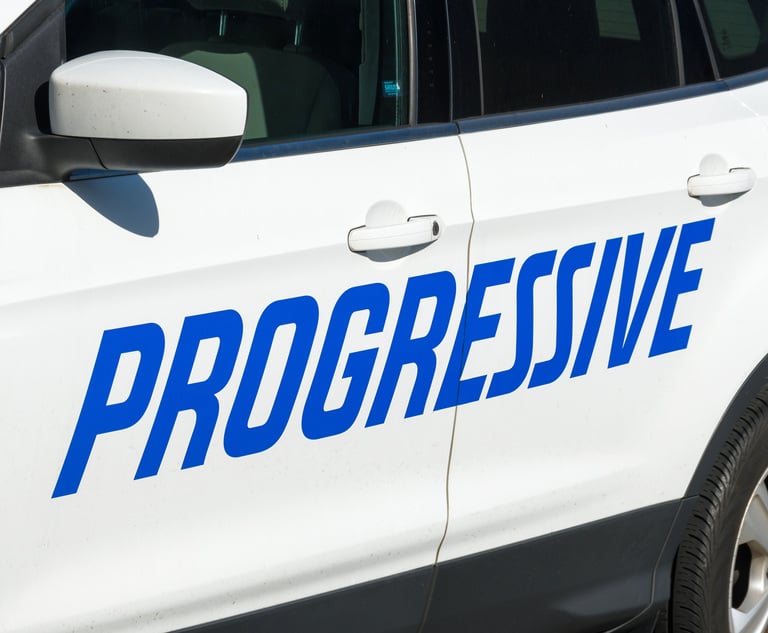Life Insurance Policy Did Not Lapse When Disabled Woman Failed To Pay Premiums, California Appeals Court Rules
The Second District Court of Appeal this week reversed a trial court's decision in favor of Farmers Insurance.
October 18, 2018 at 12:11 PM
7 minute read
This story is reprinted with permission from FC&S Legal, the industry's only comprehensive digital resource designed for insurance coverage law professionals. Visit the website to subscribe.

An appellate court in California, reversing a trial court's decision, has ruled that a life insurance policy that included a rider under which the insurer agreed to waive premiums while the insured was disabled if the insured provided the insurer with notice of her disability, did not lapse after the insured became disabled – even though she failed to provide the required notice to the insurer.
The Case
In December 1993, Maria Carada purchased a flexible premium universal life insurance policy (the “policy”) from Farmers New World Life Insurance Company. Under the policy, Farmers agreed to pay a death benefit to Ms. Carada's beneficiaries, her sons Marty and Mikel Lat, if Ms. Carada died while the policy was in force.
The policy established an “accumulation account” to which Ms. Carada's premium payments and interest were added and from which the monthly costs of insurance and other amounts were deducted. If the accumulation account was reduced below the amount needed to cover the next month's deductions, a 61-day grace period began within which Ms. Carada could pay the premium needed to cover the deduction. If the grace period expired before Farmers received the necessary premium payment, the policy was terminated and could not be reinstated.
The policy included a “Waiver of Deduction Rider” (the “Rider”) that provided that if Farmers “receive[d] proof that [Ms. Carada was] totally disabled,” Farmers would “waive the monthly deductions due after the start of and during [Ms. Carada's] continued total disability.”
The policy defined total disability as including the inability to work for “a continuous period of at least six months.” The deduction waiver, therefore, was based on the occurrence of Ms. Carada's total disability, as defined in the Rider.
The Rider further provided that Farmers needed to receive written notice of disability during the period of disability “unless it can be shown that notice was given as soon as reasonably possible.” The Rider “will end when,” among other events, “the policy ends.”
In August 2012, Ms. Carada was diagnosed with stage 4 colon cancer. The illness and its treatment rendered her unable to work and totally disabled as of August 2012.
On May 20, 2013, Farmers sent a letter to Ms. Carada advising her that the “premium payments received to date are insufficient to pay for the insurance coverage provided under the policy.” The letter warned Ms. Carada that the policy was “in danger of lapsing” and stated that if Farmers did not receive a payment by the end of the grace period – July 20, 2013 – the policy would “lapse and all coverage will terminate.” Farmers sent a similarly worded letter to Ms. Carada on June 19, 2013.
On July 23, 2013, Farmers sent Ms. Carada a letter stating that the policy's “grace period has expired” and that the coverage under the policy was “no longer in force.”
In August 2013, Ms. Carada contacted the insurance agent who had sold her the policy. She advised the agent of her illness and disability and asked if the policy could be reinstated. The agent informed a Farmers representative that Ms. Carada was dying of cancer and asked if the policy could be reinstated. The representative told the agent that the policy had lapsed and could not be reinstated. The agent relayed this information to Ms. Carada.
Ms. Carada died on September 23, 2013.
Thereafter, the Lats contacted Farmers to claim the policy's death benefits. Farmers advised them that they were not entitled to receive the death benefit because the policy had lapsed.
In November 2013, the Lats sued Farmers, alleging causes of action against the insurer for breach of contract, breach of the implied covenant of good faith and fair dealing, and vicarious liability for the alleged negligence of its agent.
Farmers moved for summary judgment, which the trial court granted. The trial court explained that “the policy provides that it will lapse upon the expiration of [a] 61-day grace period following a delinquency in premium payments. The Rider provides that it ends when the policy ends. In this case, it is undisputed that [Ms. Carada] did not make her premium payments within the 61-day grace period, and that she did not make a disability claim or offer proof of her disability until after the grace period elapsed. Consequently, the policy lapsed, and so too did the Rider.”
The Lats appealed. They argued that Ms. Carada was totally disabled within the meaning of the Rider and, therefore, that the deductions that caused Farmers to declare a policy lapse were waived. Although Ms. Carada had not given to Farmers notice of her disability as required by the Rider, the Lats contended that the notice requirement was excused by California's notice prejudice rule.
For its part, Farmers contended that Ms. Carada's policy terminated in July 2013 when her accumulation account fell to a level that was insufficient to pay for coverage and she failed to make a premium payment within the 61-day grace period. Once the policy ended, Farmers argued, the Rider ended and could not be invoked by Ms. Carada or the Lats.
The Appellate Court's Decision
The appellate court reversed.
In its decision, the appellate court explained that, under the notice prejudice rule, an insurance company may not deny an insured's claim under an occurrence policy such as the one Farmers had issued to Ms. Carada based on lack of timely notice or proof of claim unless it could show actual prejudice from the delay. The appellate court added that the insurer had the burden of establishing prejudice, and that prejudice was not presumed by delay alone
Here, the appellate court continued, Ms. Carada was totally disabled while the policy was in force and she would have been entitled to the deduction waiver benefit under the Rider if she had given Farmers timely notice of her disability. The appellate court then stated:
Under a straightforward application of the notice prejudice rule, Farmers could not deny [Ms.] Carada the benefit of the deduction waiver unless Farmers suffered actual prejudice from the delayed notice. Farmers has made no such showing and, therefore, [Ms.] Carada was entitled to the deduction waiver benefit. If Farmers had provided that benefit, [Ms.] Carada's policy would have been in force at the time of her death.
The appellate court added that the fact that Farmers was unaware of Ms. Carada's disability when it declared the policy had lapsed explained why it declared that the policy had lapsed, but that once it learned of Ms. Carada's disability and, therefore, her entitlement to the deduction waiver, Farmers' continued refusal to honor its contractual obligations to Ms. Carada and her beneficiaries precluded summary judgment in its favor.
Accordingly, the appellate court concluded, Farmers had not established that, as a matter of law, Ms. Carada's policy had lapsed or that it was justified in denying her beneficiaries' claim under the policy.
The case is Lat v. Farmers New World Life Ins. Co., No. B282008 (Cal. Ct.App. Oct. 16, 2018). Attorneys involved include: Kantor & Kantor, Glenn R. Kantor, and Alan E. Kassan for Plaintiffs and Appellants. Hinshaw & Culbertson, Royal F. Oakes, and Michael A. S. Newman for Defendant and Respondent.
Steven A. Meyerowitz, Esq., is the Director of FC&S Legal, the Editor-in-Chief of the Insurance Coverage Law Report, and the Founder and President of Meyerowitz Communications Inc. As FC&S Legal Director, Mr. Meyerowitz, a member of the team that conceptualized FC&S Legal, provides daily analysis and commentary on the most significant insurance coverage law decisions from courts across the country and news regarding legislative and regulatory developments. A graduate of Harvard Law School, Mr. Meyerowitz was an attorney at a prominent Wall Street law firm before founding Meyerowitz Communications Inc., a law firm marketing communications consulting company.
This content has been archived. It is available through our partners, LexisNexis® and Bloomberg Law.
To view this content, please continue to their sites.
Not a Lexis Subscriber?
Subscribe Now
Not a Bloomberg Law Subscriber?
Subscribe Now
NOT FOR REPRINT
© 2024 ALM Global, LLC, All Rights Reserved. Request academic re-use from www.copyright.com. All other uses, submit a request to [email protected]. For more information visit Asset & Logo Licensing.
You Might Like
View All
Insurers Dodge Sherwin-Williams' Claim for $102M Lead Paint Abatement Payment, State High Court Rules


'A Wake Up Call to the Life Insurance Industry:' California Sues Insurers
3 minute read
Federal Judge Sides With Lyft Driver in Contractual Dispute Over $1M Uninsured Motorist Coverage
5 minute readTrending Stories
Who Got The Work
Michael G. Bongiorno, Andrew Scott Dulberg and Elizabeth E. Driscoll from Wilmer Cutler Pickering Hale and Dorr have stepped in to represent Symbotic Inc., an A.I.-enabled technology platform that focuses on increasing supply chain efficiency, and other defendants in a pending shareholder derivative lawsuit. The case, filed Oct. 2 in Massachusetts District Court by the Brown Law Firm on behalf of Stephen Austen, accuses certain officers and directors of misleading investors in regard to Symbotic's potential for margin growth by failing to disclose that the company was not equipped to timely deploy its systems or manage expenses through project delays. The case, assigned to U.S. District Judge Nathaniel M. Gorton, is 1:24-cv-12522, Austen v. Cohen et al.
Who Got The Work
Edmund Polubinski and Marie Killmond of Davis Polk & Wardwell have entered appearances for data platform software development company MongoDB and other defendants in a pending shareholder derivative lawsuit. The action, filed Oct. 7 in New York Southern District Court by the Brown Law Firm, accuses the company's directors and/or officers of falsely expressing confidence in the company’s restructuring of its sales incentive plan and downplaying the severity of decreases in its upfront commitments. The case is 1:24-cv-07594, Roy v. Ittycheria et al.
Who Got The Work
Amy O. Bruchs and Kurt F. Ellison of Michael Best & Friedrich have entered appearances for Epic Systems Corp. in a pending employment discrimination lawsuit. The suit was filed Sept. 7 in Wisconsin Western District Court by Levine Eisberner LLC and Siri & Glimstad on behalf of a project manager who claims that he was wrongfully terminated after applying for a religious exemption to the defendant's COVID-19 vaccine mandate. The case, assigned to U.S. Magistrate Judge Anita Marie Boor, is 3:24-cv-00630, Secker, Nathan v. Epic Systems Corporation.
Who Got The Work
David X. Sullivan, Thomas J. Finn and Gregory A. Hall from McCarter & English have entered appearances for Sunrun Installation Services in a pending civil rights lawsuit. The complaint was filed Sept. 4 in Connecticut District Court by attorney Robert M. Berke on behalf of former employee George Edward Steins, who was arrested and charged with employing an unregistered home improvement salesperson. The complaint alleges that had Sunrun informed the Connecticut Department of Consumer Protection that the plaintiff's employment had ended in 2017 and that he no longer held Sunrun's home improvement contractor license, he would not have been hit with charges, which were dismissed in May 2024. The case, assigned to U.S. District Judge Jeffrey A. Meyer, is 3:24-cv-01423, Steins v. Sunrun, Inc. et al.
Who Got The Work
Greenberg Traurig shareholder Joshua L. Raskin has entered an appearance for boohoo.com UK Ltd. in a pending patent infringement lawsuit. The suit, filed Sept. 3 in Texas Eastern District Court by Rozier Hardt McDonough on behalf of Alto Dynamics, asserts five patents related to an online shopping platform. The case, assigned to U.S. District Judge Rodney Gilstrap, is 2:24-cv-00719, Alto Dynamics, LLC v. boohoo.com UK Limited.
Featured Firms
Law Offices of Gary Martin Hays & Associates, P.C.
(470) 294-1674
Law Offices of Mark E. Salomone
(857) 444-6468
Smith & Hassler
(713) 739-1250






